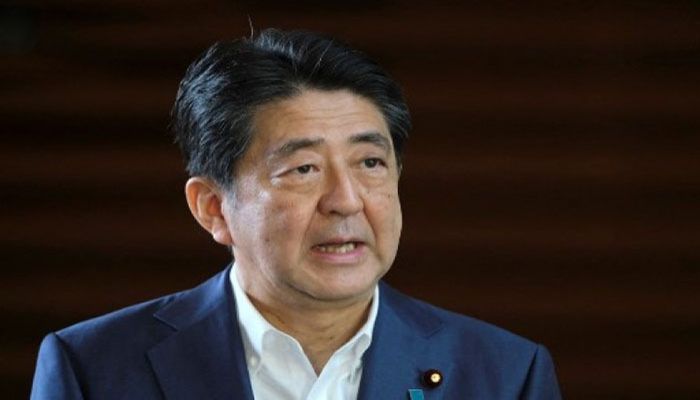
Desk Report
Publish: 08 Jul 2022, 03:16 pm

Photo: Collected
Japan's former prime minister Shinzo Abe has been confirmed dead after he was shot at a campaign event on Friday, public broadcaster NHK and Jiji news agency reported, reports AFP.
"According to a senior LDP (Liberal Democratic Party) official, former prime minister Abe died at a hospital in Kashihara city, Nara region, where he was receiving medical treatment. He was 67," NHK said.
"Former prime minister Abe was shot at around 11:30am," in the country's western region of Nara, Chief Cabinet Secretary Hirokazu Matsuno told reporters.
"One man, believed to be the shooter, has been taken into custody.
"Whatever the reason, such a barbaric act can never be tolerated, and we strongly condemn it," Matsuno added.
Local media including national broadcaster NHK and the Kyodo news agency said Abe appeared to be in "cardiorespiratory arrest", a term often used in Japan before a feared death can be officially confirmed by a coroner.
The attack on a man who may be Japan's best-known politician comes despite the country's famously low levels of violent crime and tough gun laws, and with politicians campaigning ahead of upper house elections on Sunday.
Abe had been delivering a stump speech with security present, but spectators were able to approach him fairly easily.
Footage broadcast by NHK showed him standing on a stage when a loud blast was heard with smoke visible in the air.
As spectators and reporters ducked, a man was shown being tackled to the ground by security.
Local media identified the man as 41-year-old Tetsuya Yamagami, citing police sources, with several media outlets describing him as a former member of the Maritime Self-Defense Force, the country's navy.
'A large bang'
Witnesses at the scene described shock as the political event turned into chaos.
"He was giving a speech and a man came from behind," a young woman at the scene told NHK.
"The first shot sounded like a toy bazooka. He didn't fall and there was a large bang. The second shot was more visible, you could see the spark and smoke," she added.
"After the second shot, people surrounded him and gave him cardiac massage."
Abe was bleeding from the neck, witnesses said and photographs showed. He was reportedly initially conscious but subsequently lost consciousness, NHK reported.
An official at Nara Medical University hospital told AFP: "What we can share now is that his transfer here has been completed," declining to comment on Abe's status.
Officials from the local chapter of Abe's Liberal Democratic Party said there had been no threats before the incident and that his speech had been announced publicly.
Prime Minister Fumio Kishida, himself on the campaign trail, was returning to Tokyo and expected to speak upon arrival.
Jiji reported a government task force had been formed in the wake of the incident, and reaction was already beginning to pour in.
US Secretary of State Antony Blinken voiced alarm over the shooting.
"This is a very, very sad moment," Blinken told reporters at a G20 meeting in Bali, saying the United States was "deeply saddened and deeply concerned".
Thailand's Prime Minister Prayut Chan-O-Cha was "very shocked" at Abe's shooting, the kingdom's foreign affairs minister said, describing the pair as friends.
'Profoundly sad and shocking'
Kishida's special advisor Gen Nakatani told reporters "terror or violence can never be tolerated," Jiji reported.
Abe, Japan's longest-serving prime minister, held office in 2006 for one year and again from 2012 to 2020, when he was forced to step down due to the debilitating bowel condition ulcerative colitis.
He is a hawkish conservative who pushed for the revision of Japan's pacifist constitution to recognise the country's military and has stayed a prominent political figure even after his resignation.
Japan has some of the world's toughest gun-control laws, and annual deaths from firearms in the country of 125 million people are regularly in single figures.
Getting a gun licence is a long and complicated process even for Japanese citizens, who must first get a recommendation from a shooting association and then undergo strict police checks.
Japan has seen "nothing like this for well over 50 to 60 years," Corey Wallace, an assistant professor at Kanagawa University who focuses on Japanese politics, told AFP.
He said the last similar incident was likely the 1960 assassination of Inejiro Asanuma, the leader of the Japan Socialist Party, who was stabbed by a right-wing youth.
"But two days before an election, of a (man) who is so prominent... it's really profoundly sad and shocking."
He noted, too, that Japanese politicians and voters are used to a personal and close-up style of campaigning.
"This could really change."
Subscribe Shampratik Deshkal Youtube Channel
© 2024 Shampratik Deshkal All Rights Reserved. Design & Developed By Root Soft Bangladesh